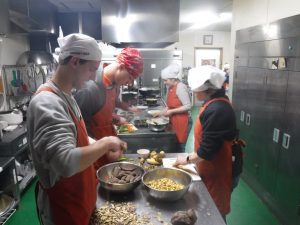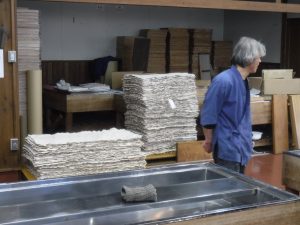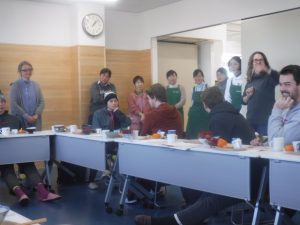The very first prompt we were tasked to answer was “what is good food?” and throughout our time here in Japan I have been able to add to our definition every single day. My initial answer was focused specifically on how the food is prepared and how it is enjoyed. This definition was based solely off of my own experiences with enjoying good food. Which has been the times in which I know how much care and effort is placed into preparing the food, as well as the company around me when I finally get to enjoy the food. However, after having the opportunities to see how the people of Japan go about getting their food, whether it be in the basement of a department store, food stands, farmers markets, specific individual teachings, or co-ops, my definition of what good food is has swelled. I now see how important food is for each community, and more specifically each individual, within Japan.

The individuality and care that I witnessed, not only about food but other aspects as well, was first was with our lecture from Mr. Asami, and then reiterated by our excursion to Nagawamachi. Mr. Asami talked about how it important the individual is to the community and in a broader scale, how important a small grassroots movement such as organic farming is to the overall problems of pollution and environmental sustainability in Japan. I enjoyed how deeply affected Mr. Asami was by his village, and his story of trying to maintain lost arts and learn as much as he can from the elders, because these arts will be lost forever if people don’t take a concerted effort in sustaining them. A prime example of this intentional effort was presented to us when we got the chance to learn how to make Yoshowma, Mayadouma, and paper. These two very specialized skills have been overtaken by industrialization and the booming of technology, but these individuals still made it a point to maintain these arts because it has been a staple and a key component of Japanese culture for centuries. That is why it essential for the people in this small town to hold onto their specific skill sets and pass it on to as many people as they can, so that a piece of their culture is never lost.

A specific instance in which I was reminded about this first prompt, was after our visit to the Yatsuba Co-op. We were given the opportunity to tour the co-op in a way that we could see the whole production side of what makes a food Co-op work. From seeing the catalog that members get every week, to walking through the packaging and transportation systems involved we truly got to see the full scope of well respected co-op. This was my first real in depth look into how a co-op works, and I am impressed with how many different layers there are to an operation like this. Learning that this specific food co-op in Yatsuba provides food for over 20 thousand families is astonishing. On top of that, the opportunity that this co-op offers it’s members a chance to work for them seems like a great deal. I’m not sure if all food co-ops work in this mutually beneficial way, but the sense that I got from the Yatsuba Co-op was that this operation truly cares for the individuals that make it run so effectively.
This whole tour finally came to an end, when we were so generously treated to lunch made from members of the food Co-op themselves, and gained a new level of knowledge about what good food is. Again, the individual care that was placed into creating our meal was something that I did not take for granted. Being in the company of my classmates, eating an incredible home-cooked meal, from strangers who placed so much effort into preparation, blew me away. Getting the chance to hear from the Co-op members/cooks themselves allowed me to gain a deeper perspective to what they deem as important when it comes to good food. These cooks were also mothers, and stated that this was a main reason in why they became Co-op members. It is important for these mothers to understand and know where this food is coming from and who is supplying it.

All of these experiences have became added layers to my definition of good food.
Recent Comments